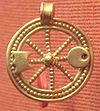
A | B | C | D | E | F | G | H | CH | I | J | K | L | M | N | O | P | Q | R | S | T | U | V | W | X | Y | Z | 0 | 1 | 2 | 3 | 4 | 5 | 6 | 7 | 8 | 9
Litavis (Gaulish: Litauī 'Earth', lit. 'the Broad One')[1][2] is a Gallic deity whose cult is primarily attested in east-central Gaul during the Roman period.[1] She was probably originally an earth-goddess.[2][1][3] In medieval Celtic languages, various terms derived from *Litauia came to designate the Brittany Peninsula.[2]
Epigraphic evidence

Her name is found in inscriptions found at Aignay-le-Duc and Mâlain of the Côte-d'Or, France, where she is invoked along with the Gallo-Roman god Mars Cicolluis in a context which suggests that she might have been his consort.[citation needed] Also, a Latin dedicatory inscription from Narbonne (which was in the far south of Gaul), France, bears the words "MARTI CICOLLUI ET LITAVI" ("To Mars Cicolluos and Litavis").[4][5]
Name
Etymology
The Gaulish divine name Litauī ('Earth', lit. 'the Vast One') likely stems from Proto-Celtic *flitawī ('broad'; cf. Old Breton litan, Middle Welsh llydan, 'broad'),[6] ultimately from Proto-Indo-European *Pleth2-wih1 ('the Broad One'; cf. Sanskrit Pṛthvī, Greek Plátaia; also Old Norse fǫld, 'earth').[1][2][7][3]
The Gaulish personal name Litauicos ('sovereign', lit. 'possessor of the land') is also cognate with the Welsh Llydewig, meaning 'pertaining to Brittany', pointing to a Proto-Celtic term *Litauī-kos, here attached to the determinative suffix -kos.[1]
Medieval terms
The medieval or 'neo-Celtic' names for the Brittany Peninsula (cf. Old Irish Letha, Old Welsh Litau, Old Breton Letau, Latinized as Letavia) all stem from an original *Litauia, meaning 'Land' or 'Country'.[2] In the Irish Lebor Bretnach (11th c.), Bretain Letha means 'Britons of the Continent or Armorica, i.e. Bretons.' Linguist Rudolf Thurneysen proposed a semantic development from an Ancient Celtic term meaning 'broad land, continent' into the Insular Celtic names for the part of the Continent nearest the British Islands.[1]
References
- ^ a b c d e f g Koch 2006, p. 1159.
- ^ a b c d e Delamarre 2003, pp. 204–205.
- ^ a b West 2007, pp. 177–178.
- ^ Koch, John T. "Ériu, Alba, and Letha: When Was a Language Ancestral to Gaelic First Spoken in Ireland?" Emania: Bulletin of the Navan Research Group 9 (1991): 17–27.
- ^ Barbet, Gérald; Billerey, Robert. "Une plaque de bronze avec dédicace découverte en Franche-Comté". In: Gallia, tome 61, 2004. p. 286. DOI: https://doi.org/10.3406/galia.2004.3065; www.persee.fr/doc/galia_0016-4119_2004_num_61_1_3065
- ^ Bader, Françoise. "Les grands de l'Iliade et les Achéménides". In: Revue des Études Grecques, tome 112, Juillet-décembre 1999. p. 375. DOI: https://doi.org/10.3406/reg.1999.4376; www.persee.fr/doc/reg_0035-2039_1999_num_112_2_4376
- ^ Matasović 2009, p. 135.
Bibliography
- Delamarre, Xavier (2003). Dictionnaire de la langue gauloise: Une approche linguistique du vieux-celtique continental (in French). Errance. ISBN 9782877723695.
- Matasović, Ranko (2009). Etymological Dictionary of Proto-Celtic. Brill. ISBN 9789004173361.
- Koch, John T. (2006). Celtic culture : a historical encyclopedia. ABC-CLIO. ISBN 1-85109-440-7.
- West, Martin L. (2007). Indo-European Poetry and Myth. Oxford University Press. ISBN 978-0-19-928075-9.
Further reading
- "Litavia" — article in Jones' Celtic Encyclopedia by Mary Jones
- "Litavis" — Litavis in the will of Lingon (in French); automatic Google translation into English
- Etymological translations of "Litanus," "Litaui/Litavi," "Litauis/Litavis," etc. by Patrick Cuadrado (in French); automatic Google translation into English
Text je dostupný za podmienok Creative Commons Attribution/Share-Alike License 3.0 Unported; prípadne za ďalších podmienok. Podrobnejšie informácie nájdete na stránke Podmienky použitia.
Antropológia
Aplikované vedy
Bibliometria
Dejiny vedy
Encyklopédie
Filozofia vedy
Forenzné vedy
Humanitné vedy
Knižničná veda
Kryogenika
Kryptológia
Kulturológia
Literárna veda
Medzidisciplinárne oblasti
Metódy kvantitatívnej analýzy
Metavedy
Metodika
Text je dostupný za podmienok Creative
Commons Attribution/Share-Alike License 3.0 Unported; prípadne za ďalších
podmienok.
Podrobnejšie informácie nájdete na stránke Podmienky
použitia.
www.astronomia.sk | www.biologia.sk | www.botanika.sk | www.dejiny.sk | www.economy.sk | www.elektrotechnika.sk | www.estetika.sk | www.farmakologia.sk | www.filozofia.sk | Fyzika | www.futurologia.sk | www.genetika.sk | www.chemia.sk | www.lingvistika.sk | www.politologia.sk | www.psychologia.sk | www.sexuologia.sk | www.sociologia.sk | www.veda.sk I www.zoologia.sk


